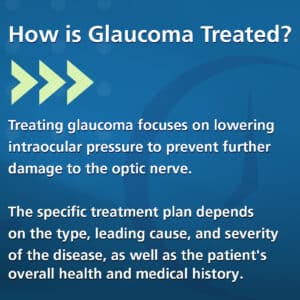At Tower Clock Eye Center, we’re here to help you manage your glaucoma with the best care available. Our team of experienced ophthalmologists uses advanced technology combined with a personalized approach to provide the best glaucoma surgery in Wisconsin.
Whether you’re exploring laser treatments, surgery, or other options, your vision is our priority, and we’re here to guide you every step of the way. Call us at (920) 499-3102 or visit one of our clinics in Green Bay, Appleton or Shawano to get started.
What Is Glaucoma?
Glaucoma is a progressive eye disease that damages the optic nerve, often caused by increased pressure inside the eye. It’s one of the leading causes of blindness worldwide. This eye condition is sometimes called the “silent thief of sight” because it often develops slowly without any clear symptoms.
You might not even notice symptoms until substantial vision loss has already occurred. That’s why early detection is so important, as regular eye exams help catch it before it causes permanent damage.
Protecting Your Optic Nerve
The optic nerve is essential for vision, as it sends visual information from the eye to the brain. Glaucoma damages this nerve by increasing eye pressure, which can cause vision loss if not properly treated. Our goal is to protect your optic nerve because, if left untreated, glaucoma can lead to permanent blind spots and a reduction in your central vision.
Types of Glaucoma

- Open-Angle Glaucoma: This is the most common type of glaucoma. It develops when drainage out of the eye becomes partially blocked, leading to too much fluid accumulating. Because chronic open-angle glaucoma progresses slowly, it often causes a gradual loss of side vision without immediate symptoms.
- Closed-Angle Glaucoma: This is a medical emergency. It occurs when the eye’s drainage center is blocked, causing a sudden rise in intraocular pressure that can lead to severe pain and vision loss if untreated.
To catch these conditions early and prevent further damage to your optic nerve, make sure you get regular screenings. Reach out to us today, and let’s discuss how we can help preserve your vision.
How Is Glaucoma Treated?

Medications: Typically, eye drops are the first line of defense. They work by either reducing fluid production or improving drainage in the eye. It’s important to follow your prescribed regimen to keep your pressure under control.
Laser Treatments: If medications aren’t enough, laser treatments like trabeculoplasty can help improve fluid drainage. These are minimally invasive, virtually painless procedures, often done on an outpatient basis.
Minimally Invasive Glaucoma Surgery (MIGS): For those with mild to moderate glaucoma, MIGS options including the Xen Gel Stent can create small incisions to help the eye drain fluid better. Recovery time is short, and the success rates are excellent. Our surgeons also feature the iStent device, another minimally invasive option, often used in conjunction with cataract surgery.
Traditional Glaucoma Surgery: In more advanced cases, surgery such as tube shunts or trabeculectomy may be required to create a new drainage pathway and significantly lower eye pressure.
Cataract Surgery: If you also have cataracts, cataract surgery can improve fluid drainage and lower eye pressure. Sometimes, both glaucoma and cataracts can be treated in a combined surgery.
Have questions about glaucoma or need to schedule an eye exam? Contact us today to learn more about your options and take the first step toward protecting your vision.
Who Is at Risk for Glaucoma?

- Family history: A parent, sibling or child with glaucoma increases your risk of developing the condition.
- Age: Your risk increases significantly after age 40.
- Medical conditions: Chronic conditions such as diabetes, hypertension and a history of heart attacks can contribute to the development of glaucoma.
- Ethnicity: African Americans and Hispanics are at higher risk for open-angle glaucoma, while Asian populations are more prone to angle closure glaucoma.
- Eye injuries: Trauma to the eye can lead to structural changes that increase the risk of glaucoma.
Why Early Detection Matters

At Tower Clock Eye Center, we use cutting-edge diagnostic tools to detect glaucoma early. Tests like visual field exams and detailed OCT (Ocular Coherence Tomography) imaging of the optic nerve help us spot problems before they become serious.
Contact us today to schedule an appointment and take proactive steps in managing your glaucoma and safeguarding your vision.
Contact Tower Clock Eye Center Today
If you’re noticing vision changes or are at risk for glaucoma, don’t wait to seek treatment. Early intervention can make all the difference. Schedule a consultation with one of our experts today at Tower Clock Eye Center, and let’s discuss your options to protect your vision.
Call us at (920) 499-3102 or request a consultation online. Your vision is too important to ignore. Let’s work together to keep it healthy!
